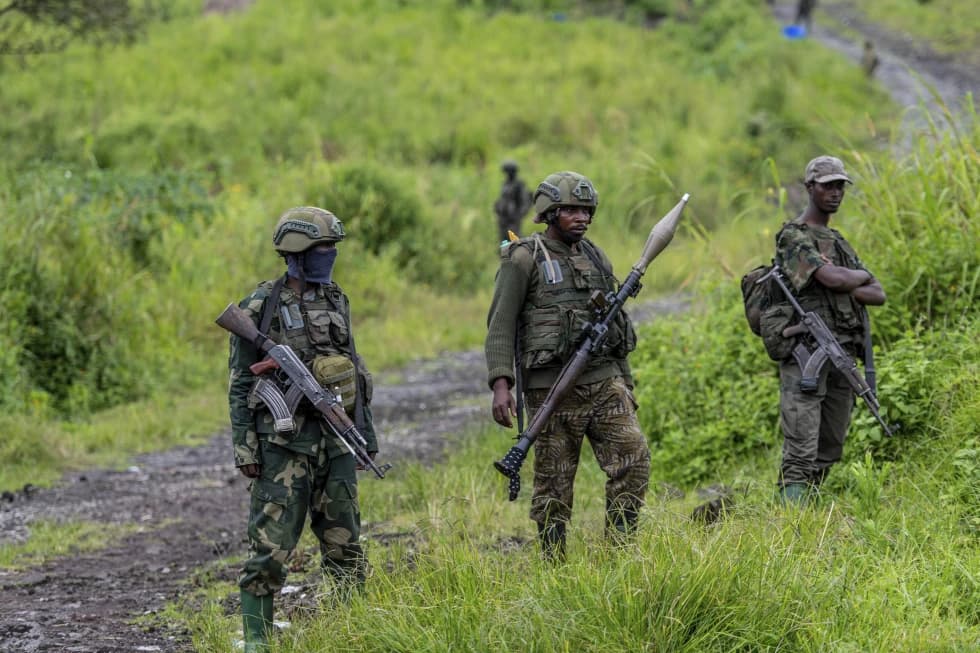YAOUNDÉ, Cameroon – Amid one of the world’s most serve and lethal humanitarian crises, the Catholic Church in the eastern Democratic Republic of Congo is struggling to deliver an especially precious commodity alongside such basics as food, shelter and medicine – to wit, they’re trying to offer hope.
Bishop Sikuli Paluku Melchisédech of Butembo-Beni in the DRC said the work of the Church in such a dangerous place is part of its mission.
“We have a vision, it is the mission of the Church that we are in the process of accomplishing, according to the circumstances of the moment and the possibilities that we have to intervene with our sisters who are in need,” he said.
“We don’t always have a lot of resources, but what counts above all is having people who believe in Christ who loved us,” Sikuli said.
The crisis in eastern Congo is fueled by a conflict between two rebel groups, the Allied Democratic Forces (ADF) and the 23 March Movement (M23), vying to control the mineral wealth and other natural resources of the region. The conflict has driven many families from their villages, seeking refuge in areas they hope are safe from violence.
Alongside the devastating death toll from the conflict, the war also has significantly weakened the health system, educational capacities and agricultural productivity.
Francois Kaputu, Caritas programs coordinator at the Butembo-Beni diocese, says the situation is so bad that people are caught “between a rock and a hard place.”
“For over two decades, the diocese of Butembo-Beni has been faced with an unbearable social, security and humanitarian situation,” he told Crux.
He said the eastern part of the region is largely controlled by the Rwanda-backed militia, the M23, while the rebel movement, the ADF, has occupied the north. The result, he said, is that “the population is living under siege.”
Kaputu described a “large-scale massacre of the population” by the rebel groups, saying that the violence has triggered “poverty, massive displacement of the population, loss of human life, psychosocial trauma, economic collapse, and made access to the farms almost impossible in a region where 80 percent of the population depends on agriculture for their subsistence.”
“After losing all their possessions to looting, the affected individuals can no longer access their fields, leaving them in a dire situation. Additionally, the health infrastructure suffered significant damage, with solar panels and essential food storage materials, including fridges, being looted. This looting has severely impacted the ability to store certain medicines properly, which is particularly concerning amid the ongoing M’Pox epidemic,” Kaputu said.
He said a case of M’Pox was already detected in the town of Alindo thereby highlighting the potential for the epidemic to become a disaster given the looting in the health sector.
“The priority needs include essential survival items or household and social products. Additionally, health remains a significant concern.”
The warring parties are now observing a 15-day hiatus in fighting to allow for humanitarian assistance to reach people in desperate need of assistance.
“There is a precarious calm in the areas under occupation by the March 23 movement as well as in the areas still under occupation of the armed forces of the DRC,” Kaputu said.
He said Caritas has to urgently respond to this need and think now about actions of community resilience.
He stated that Caritas has been able to take significant actions by first ensuring effective humanitarian coordination and alerting people of good will about the situation. This has been accomplished primarily through the Caritas network, but it’s not been easy, given that resources are few and far between.
“It is a situation that requires much more resources than are available,” he said. “We need good-willed people who can support the diocese through this good-willed ability to continue to respond to their needs.”
He said the security situation hasn’t deterred the Church from restoring hope among the population, with part of the approach being to give particularly young people the skills they need in order to improve their lives.
Addressing Catholic health workers involved in helping the wounded and the sick, the
“What we (as a local Church) have to do is part of our mission, and the principle tells us that we have to do it properly. We intervene in this field of health because it is in the name of this human being who is the subject of our mission, to whom we must proclaim the living gospel and also act accordingly as far as possible to show that this is the Good News.”.
Sikuli echoed the point in an address to health workers.
“I would like to thank you for who you are, what you do and the way you do it in our health facilities,” he said. “Despite the insecurity and difficult situations in our diocese, you continue to do your jobs to relieve the sick. The diocese has become large, the needs are many, but no one can claim to do all the good, but the little good that we can do, we must do well.”
“We’re in the health sector, and it’s like an evangelization space where the principle should be, ‘You receive freely, give freely too.’”














